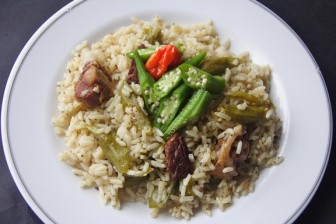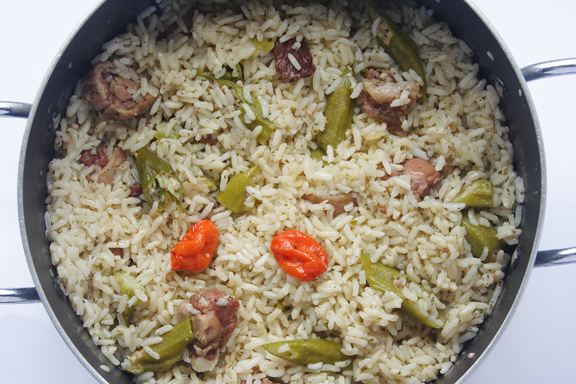Hi Everyone,
If you haven’t yet, then I urge you to pick up a copy of Barbadian Austin Clarke’s food memoir, Pig Tails ‘n Breadfruit: Rituals of Slave Food. You will laugh, learn and salivate at his offerings. I did and still do, which brings me to the topic of this column, Privilege.
Though a learned man, an eloquent man, Austin Clarke stammered his response to the late and former Prime Minister of Barbados, Errol Barrow, when questioned as to whether or not he knew what ‘privilege’ is. “Privilege, sir, is… ahm…a right sir. Or an advantage. Privilege, Prime Minister, could be an immunity granted to a person, or to a class or…” Barrow laughed at Clarke’s response and said, “not that kind of privilege! I mean real privilege.”
The prime minister explained, “Privilege is slave food man. I just cooked this. We’re having Privilege for dinner.”
 Bowled over by the plate of rice cooked with okra, pigtails and salt beef that was offered to him that “went down smooth, smooth, smooth…” Clarke learned about real privilege.
Bowled over by the plate of rice cooked with okra, pigtails and salt beef that was offered to him that “went down smooth, smooth, smooth…” Clarke learned about real privilege.
I quickly finished reading the chapter, promptly put down the book and headed into the kitchen to make some Privilege. Fortunately, I had everything I needed for the dish.

As I set about cutting up and preparing the ingredients to make some Privilege, it reminded me of Guyanese Okra Cook-Up Rice, same ingredients really with the exception that the dish would be cooked with fresh coconut milk. My, how similar we are, yet different. It is clear that we have a shared history. Simple dishes like Privilege provide the backbone and structure for many Caribbean dishes. It is symbolic of how we can make-do; we can take a few
ingredients and turn them, into a wholesome delicious and nutritious meal.
Peasant dishes such as Privilege are important signposts that connect us; they help identify us. Today I offer you some real Bajan Privilege, not as an artist, not as an intellectual, and not impress, but rather, out of respect for the humble beginnings of our cuisine. I offer you, Privilege.
Privilege
Serves 4 – 5
Ingredients
2 (6-inch) pieces salted pigtail, cut into 1-inch pieces
6 ounces salt beef, cut into small chunks
Water
3 tablespoons canola or vegetable oil
¾ cup diced onions
1 heaped tablespoon minced fresh thyme
12 – 14 okras, cut anyway you like or left whole
1 – 2 whole big peppers (use wiri wiri if you like)
2 cups parboiled rice (aka brown rice in Guyana); you can use regular white rice too
Directions
1. Add the pigtails and salt beef to a medium sized saucepan and fill with water to just cover the salt meat. Place on high heat and bring to a boil. Boil for 6 – 8 minutes and drain well.
2. Add oil to a large pot and heat on medium high heat.
3. Toss in onions and thyme and let cook until the onions are translucent. Add salted meat and sauté for 1 minute (be careful, the salt meat will pop so partially cover the pot).
4. Add 1 cup water to the salt meat mixture, cover pot and bring to a boil. When it comes to a boil, reduce heat to low and let cook until ¾ of the water is gone.
5. Wash rice and add to pot and stir to mix and raise heat to high; let cook for 1 minute.
6. Add 4 cups water (if using parboiled rice or 3 cups if using regular white rice) along with okra and peppers. Stir to mix, cover pot and bring to a boil.
7. Cook for 5 minutes then taste liquid, you should not need to add salt because there should be enough from the salt meat, if there isn’t, add a little. Give the pot a good stir to mix the okra into the rice then cover pot and reduce heat to low/simmer and let cook for 45 minutes (parboiled rice) 30 minutes (white rice) or until all the liquid has dried out.
8. Fluff rice and serve. If you’re an okra lover like me, steam some okra and serve with the dish. Boiled or fried ripe plantains are excellent too.





